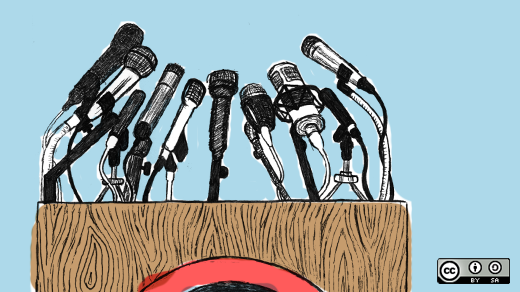Whistleblowing protections, crowdsourcing, anonymous voting processes, and even Glassdoor reviews—anonymous speech may take many forms in organizations.
As well-established and valued as these anonymous feedback mechanisms may be, anonymous speech becomes a paradoxical idea when one considers how to construct a more open organization. While an inability to discern speaker identity seems non-transparent, an opportunity for anonymity may actually help achieve a more inclusive and meritocratic environment.
But before allowing outlets for anonymous speech to propagate, however, leaders of an organization should carefully reflect on whether an organization's "closed" practices make anonymity the unavoidable alternative to free, non-anonymous expression. Though some assurance of anonymity is necessary in a few sensitive and exceptional scenarios, dependence on anonymous feedback channels within an organization may stunt the normalization of a culture that encourages diversity and community.
The benefits of anonymity
In the case of Talley v. California (1960), the Supreme Court voided a city ordinance prohibiting the anonymous distribution of handbills, asserting that "there can be no doubt that such an identification requirement would tend to restrict freedom to distribute information and thereby freedom of expression." Our judicial system has legitimized the notion that the protection of anonymity facilitates the expression of otherwise unspoken ideas. A quick scroll through any subreddit exemplifies what the Court has codified: anonymity can foster risk-taking creativity and the inclusion and support of marginalized voices. Anonymity empowers individuals by granting them the safety to speak without detriment to their reputations or, more importantly, their physical selves.
For example, an anonymous suggestion program to garner ideas from members or employees in an organization may strengthen inclusivity and enhance the diversity of suggestions the organization receives. It would also make for a more meritocratic decision-making process, as anonymity would ensure that the quality of the articulated idea, rather than the rank and reputation of the articulator, is what's under evaluation. Allowing members to anonymously vote for anonymously-submitted ideas would help curb the influence of office politics in decisions affecting the organization's growth.
The harmful consequences of anonymity
Yet anonymity and the open value of accountability may come into conflict with one another. For instance, when establishing anonymous programs to drive greater diversity and more meritocratic evaluation of ideas, organizations may need to sacrifice the ability to hold speakers accountable for the opinions they express.
Reliance on anonymous speech for serious organizational decision-making may also contribute to complacency in an organizational culture that falls short of openness. Outlets for anonymous speech may be as similar to open as crowdsourcing is—or rather, is not. Like efforts to crowdsource creative ideas, anonymous suggestion programs may create an organizational environment in which diverse perspectives are only valued when an organization's leaders find it convenient to take advantage of members' ideas.
A similar concern holds for anonymous whistle-blowing or concern submission. Though anonymity is important for sexual harassment and assault reporting, regularly redirecting member concerns and frustrations to a "complaints box" makes it more difficult for members to hold their organization's leaders accountable for acting on concerns. It may also hinder intra-organizational support networks and advocacy groups from forming around shared concerns, as members would have difficulty identifying others with similar experiences. For example, many working mothers might anonymously submit requests for a lactation room in their workplace, then falsely attribute a lack of action from leaders to a lack of similar concerns from others.
An anonymity checklist
Organizations in which anonymous speech is the primary mode of communication, like subreddits, have generated innovative works and thought-provoking discourse. These anonymous networks call attention to the potential for anonymity to help organizations pursue open values of diversity and meritocracy. Organizations in which anonymous speech is not the main form of communication should acknowledge the strengths of anonymous speech, but carefully consider whether anonymity is the wisest means to the goal of sustainable openness.
Leaders may find reflecting on the following questions useful prior to establishing outlets for anonymous feedback within their organizations:
1. Availability of additional communication mechanisms: Rather than investing time and resources into establishing a new, anonymous channel for communication, can the culture or structure of existing avenues of communication be reconfigured to achieve the same goal? This question echoes the open source affinity toward realigning, rather than reinventing, the wheel.
2. Failure of other communication avenues: How and why is the organization ill-equipped to handle the sensitive issue/situation at hand through conventional (i.e. non-anonymous) means of communication?
3. Consequences of anonymity: If implemented, could the anonymous mechanism stifle the normalization of face-to-face discourse about issues important to the organization's growth? If so, how can leaders ensure that members consider the anonymous communication channel a "last resort," without undermining the legitimacy of the anonymous system?
4. Designing the anonymous communication channel: How can accountability be promoted in anonymous communication without the ability to determine the identity of speakers?
5. Long-term considerations: Is the anonymous feedback mechanism sustainable, or a temporary solution to a larger organizational issue? If the latter, is launching a campaign to address overarching problems with the organization's communication culture feasible?
These five points build off of one another to help leaders recognize the tradeoffs involved in legitimizing anonymity within their organization. Careful deliberation on these questions may help prevent outlets for anonymous speech from leading to a dangerous sense of complacency with a non-inclusive organizational structure.





2 Comments